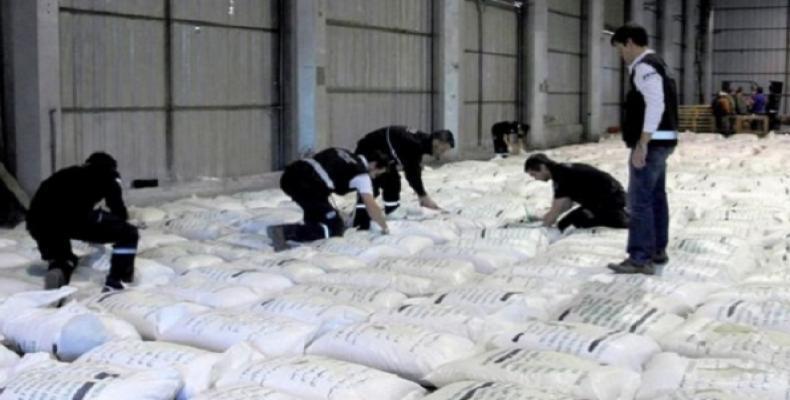Buenos Aires, September 24 (teleSUR-RHC)-- The creativity of drug traffickers to smuggle cocaine to other countries continues to surprise authorities around the world, and in the latest most peculiar way to traffic the white powder was discovered in Argentina after police dogs sniffed the narcotic impregnated in rice.
Argentine customs agents reported Wednesday they found about 30 kilograms of cocaine hidden in a way they had never seen before in a rice shipment headed for Europe via Africa.
According to AFP, the bags of rice were marked as donations for a United Nations food program in Africa. Chief of narcotics for Argentina's customs agency, Guillermo Gonzalez, told Reuters that the creative drug traffickers soaked rice in water that had been mixed with cocaine.
"Most likely, this was a test run. And if it had gone through, they would have followed through with larger volume," the customs official said.
When the water was absorbed by the rice, the grain was left invisibly "impregnated" with the addictive stimulant, Gonzalez added. "It's a new method," he said. "This is the first time we've seen technology this sophisticated."
The narcotics officials speculated that rather than employing a chemical process to extract the cocaine from the rice once it reached its destination, the traffickers would probably just grind the grains into fine powder and sell it as cocaine.
"Pure cocaine is too strong to be ingested without being cut with something. It may have been their plan to cut this shipment with the same rice that was used to carry it," he added.
Officials said 12 suspects have been arrested in what people are calling "Operation White Rice." Among those detained are Argentines and Colombians.
The cocaine-impregnated rice was discovered Sept. 17 when drug-sniffing dogs detected cocaine in a cargo of 50-kilogram rice sacks at a warehouse in the port city of Rosario. It was kept secret for a week while security agents hunted for more suspects, Reuters said.
Officials in Argentina said the new discovery also reveals the country has become a major shipping point for cocaine produced in Bolivia, Peru and Colombia. It also underscores the fact that Africa is being used as a route toward the lucrative markets of Europe.


